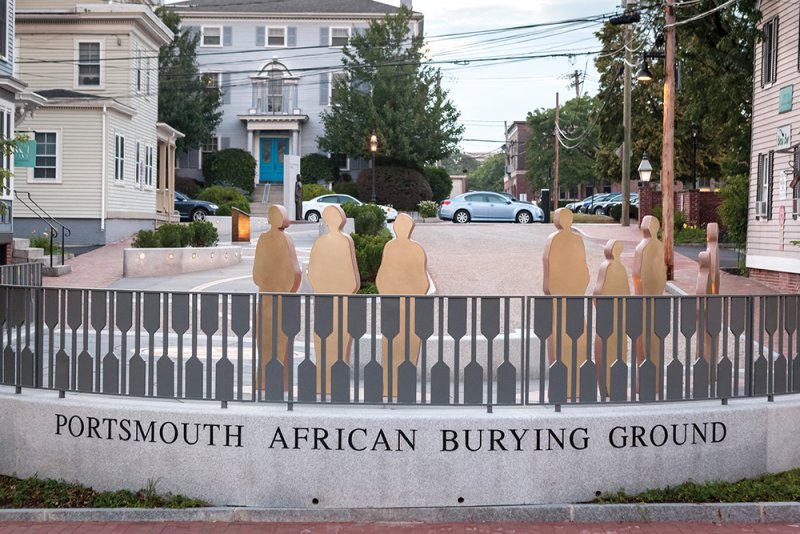
From left: JerriAnne Boggis, executive director of the Black Heritage Trail of NH; Valerie Cunningham, founder of the Portsmouth Black Heritage Trail; Rev. Robert Thompson, board president; and Attorney Jack McGee. Courtesy photo.
As NH continues to grapple with issues related to race and diversity, what often gets forgotten is that people of diverse backgrounds have long been part of NH’s communities. The Black Heritage Trail of NH has been highlighting the fact that for “more than 300 years, the lives of African people and their descendants have been a part of New Hampshire’s history. African-American history has long been hidden in the shadows even though Black lives have been intermixing with White lives in highly personal ways,” the organization states on its website.
The nonprofit originally started by establishing the Portsmouth Black Heritage Trail 20 years ago and has over the years expanded its mission and the trail to shed light on the state’s African heritage.
To help accomplish that mission, The Black Heritage Trail of NH recently acquired the building at 222 Court St. in Portsmouth from local attorney Jack McGee for its permanent home after renting space from other nonprofits. Located down the street from the African Burying Ground, the historic structure will serve as a headquarters and an interpretive center.

The inspiration for the trail and everything that has followed, says JerriAnne Boggis, executive director of The Black Heritage Trail of NH, is founder Valerie Cunningham, who realized as a young African-American girl in Portsmouth that she could not find any books or magazines that featured people to whom she could relate. As she continued to uncover stories long hidden, she co-wrote “Black Portsmouth: Three Centuries of African-American Heritage” and founded the Portsmouth Black Heritage Trail.
The organization and the trail have expanded statewide to document and mark many of the historic sites that relate the stories of the Black experience in the state. Boggis says the story of enslavement in NH begins in Portsmouth, but as they gathered forgotten history from around the state there were many surprises.
The Warner Historical Society has helped to uncover many of those stories and even has historical artifacts. Newport’s history includes the story of Vance Coit, an African-American man who established a colony of seven or eight families. “Coit Mountain is named for Vance, a Revolutionary War vet” Boggis says. “Milford has Harriet Wilson, the first Black woman to publish a novel.”
Boggis says, the center will be another way to make visible the stories that were lost and even erased from the history of NH. “Portsmouth is filled with historic homes that tell the colonial story of New England,” Boggis says, “Ours is going to be the first that tells the more inclusive story, and includes the Black history. We will be able to tell the stories that were willfully erased. With this building we are re-introducing the stories. The home at 222 Court Street was home to two enslaved people, we can tell their story, too,” she says.
The Black Heritage Trail of NH has $450,000 worth of tax credits to sell over two years and will do some additional fundraising to cover the purchase and renovation costs. Meanwhile, it is executing a multi-phase plan to expand the statewide trail, identifying collaborations with educational institutions, and partnering with historical societies. In phase 2, they plan to develop a K-12 curriculum for towns with multiple sites and host events and community dialogues. Later phases involve plans to install distinctive trail markers and create a statewide audio tour online as well as a searchable online database.
The Black Heritage Trail of NH continues to hold several events, including the 12th Annual Black New England Conference, a two-day event on Oct. 19 and 20 at the University of NH in Durham. The theme of this year’s conference is “Express Yourself: Identity, Style and Adornment,” which will explore such topics as the creation of Black identities; how and why African American style is commodified; the artistic, economic and political histories of Black hair, and interpreting anti-Black violence thought artistic expressions.
According to a statement from the organization, although there is no one way to be “authentically” African-American, there are numerous aesthetic choices that have overlapped and intertwine. At the conference, panels of academics, researchers, cultural makers and artists will explore ways in which the embodiment of aesthetic expressions serves as a point of reflection for social issues today. In addition, they will delve into how creative cultural Black movements have influenced the mainstream and provided platforms for developing societal beliefs and values.
For more information, visit blackheritagetrailnh.org.

 Current Issue - April 2024
Current Issue - April 2024